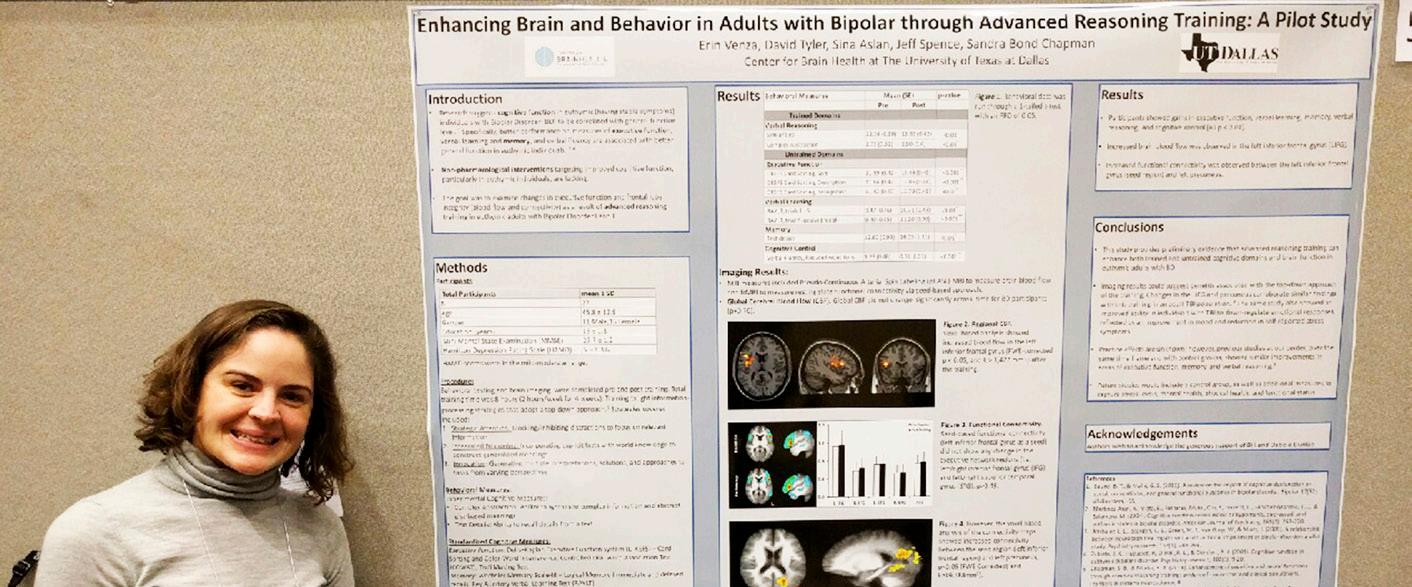
2 minute read
SEEN & HEARD 2016 SYMPOSIUM SPEAKERS
from Newletter Q2 2016
by BrainHealth
The Center for BrainHealth at The University of Texas at Dallas and its partners at the Helen Wills Neuroscience Institute at The University of California, Berkeley, presented the 10th annual Reprogramming the Brain to Health Symposium on April 14, 2016. Professor Karl Friston, FRS, FMedSci, gave the keynote address and received the 2016 Dr. Charles L. Branch BrainHealth Award (see the cover story). Approximately 250 scientists, clinicians and professionals
Connecting Neurotransmitter Fluctuations to Cognition in Health and Disease
Advertisement
Professor, Virginia Tech Carilion Research Institute and Department of Physics Virginia Tech
Professor, Wellcome Trust Centre for Neuroimaging University College London
Dr. Montague explained the benefits of directly recording the activity of dopamine via surgically-implanted electrodes in awake human patients. Dopamine is a neurotransmitter important for many aspects of our behavior such as learning and motor functions, but its concentration in the brain had never been directly recorded in humans. Thus, Dr. Montague’s work is an evolutionary breakthrough for neuroscience, since dopamine is also implicated in many disorders such as Parkinson’s.
Anxiety and Impaired Decision-Making
Under Uncertainty: A Computational Account
Assistant Professor, Department of Psychology and Helen Wills Neuroscience Institute
University of California, Berkeley Senior Research Fellow, FMRIB University of Oxford
Dr. Bishop’s recent research indicates that the more anxious someone is, the less likely they are to take risks. People with higher anxiety tend to want more information than non-anxious people before making a decision.
The Modular Brain: Implications for the Understanding and Rehabilitation of Cognitive Dysfunction
Professor of Neuroscience and Psychology
Director, Henry H. Wheeler Jr. Brain Imaging Center

University of California, Berkeley interested in the emerging field of computational neuroscience attended. 34 people participated in the poster submission; the top five student posters were awarded $500 prizes by popular vote. BrainHealth’s Nicholas Hubbard, Ph.D., and Ju-Chi Yu were among the awardees.
The brain is a modular system made up of independent and self-contained units that can be used to construct a more complex structure. The modular brain has advantages, allowing for both segregation and integration of function. This can accelerate the emergence of a complex system from a simple system by allowing one module at a time to adapt without risking loss of function in another. Specific functions can be performed without perturbing the entire system, nor does damage or injury jeopardize the entire system. Dr. D'Esposito posits that gaining a better understanding of the brain’s organization in healthy individuals will help us better understand brain change in unhealthy individuals.
Read on for take-away messages from the symposium’s distinguished speakers.
Meta-Connectomics: Meta-Analytic Approaches to Modeling Structural and Functional Networks
Professor, The University of Texas, San Antonio
Director, Research Imaging Institute
The University of Texas Health Science Center at San Antonio, TX
Human neuroimaging data is cost prohibitive and timeconsuming, making it very difcult to collect. To remedy this challenge, researchers from all over the world are contributing imaging data to large databases so that it can be shared with other scientists. Dr. Fox believes this metaanalyses of human neuroimaging data stands at the forefront of computational neurobiology.
Decision-Theoretic Depression
Professor, Director, Gatsby Computational Neuroscience Unit University College London that are present in healthy individuals and may help us to cope with our environments. It is when these aspects begin to spiral out of control that we see the disorder become dysfunctional. These atypical behaviors may become self-perpetuating and afect the way we interact with others, and most specifically, our ability to make decisions.
There are many aspects of diseases and syndromes, etc.
Microcircuits, Macrocircuits, and Working Memory Impairment in Schizophrenia: Insights from NMDA Receptor Antagonist Efects
Robert L. McNeil, Jr. Professor of Translational Research and Professor of Neurobiology, Yale School of Medicine

Chief of Psychiatry, Yale-New Haven Hospital

Director, Clinical Neuroscience
Division, VA National Center for PTSD
Director, VA Alcohol Research Center
Medical Director, Schizophrenia
Biological Research Center, DVA
Dr. Krystal discussed working-memory impairment in schizophrenia and illustrated a prediction involving novel therapeutics, such as ketamine, that would treat synaptic signaling changes inherent to an emerging model of the disorder being decoded by computational psychology approaches.











